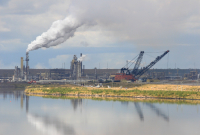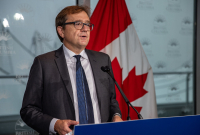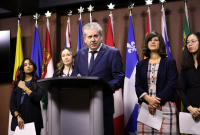Support strong Canadian climate journalism for 2025
The Gitanyow Nation is calling on both the provincial and federal governments to do something about deceptive ad campaigns that greenwash the climate impacts of liquified natural gas projects in B.C.
Its concerns relate to a deluge of paid ads across the province touting claims by gas companies that LNG is somehow a green source of energy aligned with net-zero emissions targets.
Ads like “BC LNG will reduce Global Emissions” are ubiquitous on social media, buses, airports and highway billboards, said Naxginkw, Tara Marsden, sustainability director for the Wilp, or house clans, of the Gitanyow Hereditary Chiefs (GHC).
Methane, LNG’s primary ingredient, is a powerful greenhouse gas that creates more than 80 times as much heat in the short term as carbon dioxide and 25 per cent of global warming.
Emissions from the production and burning of LNG compound climate disasters like floods, heat waves, wildfires and the loss of salmon and forests, all of which disproportionately affect First Nations, she noted.
Marsden pointed to NDP MP Charlie Angus’s private member’s bill (C-372) to curb marketing that misrepresents fossil fuels' role in heating the planet tabled in early February as a possible remedy for deceptive LNG advertising.
The bill is one way for Ottawa to create legislation with public input to deal with false ads that threaten climate progress by warping understanding of potential solutions at a time when Indigenous Peoples must decide whether to support fossil gas development projects.
“We’re really trying to look to the future. [LNG] is still very much a fossil fuel project,” Marsden said.
Gitanyow's concerns echo complaints raised by numerous environment and climate groups dismayed with fossil fuel industry marketing not just in B.C., but across Canada and overseas.
The Canadian Association of Physicians for the Environment (CAPE) was pushing for a fossil fuel ad ban for two years before working with Angus to shape Bill C-372, which is modelled after strategies aimed at preventing the tobacco industry from promoting cigarettes since smoking is harmful to human health.
The federal competition bureau is also investigating after Greenpeace accused Canada's six biggest oilsands producers of false advertising for a similar marketing campaign that suggested the fossil fuel sector was reducing greenhouse gas emissions and helping Canada achieve its climate targets.
There are seven LNG export projects in various stages of development on the West Coast. The first and largest, Phase 1 of LNG Canada in Kitimat, B.C., will begin operation in 2025.
However, the Ksi Lisims LNG project, partnered with the Nisga'a Nation and aiming to export 12 million tonnes of gas to Asian markets from B.C.’s north coast annually, is waiting for its environmental review by the province.
The Gitanyow are particularly concerned about Ksi Lisims’ potential impacts on the climate and salmon habitat as well as the pipeline’s possible route and construction, which the nation says it hasn’t had adequate time to evaluate.
The nation wants the province to delay its assessment decision and is calling for proof of the Ksi Lisims LNG emissions claim the project is “net-zero ready with the lowest global footprint of any global project.”
Following the approval of the much smaller Cedar LNG project last year, Premier David Eby announced B.C. will develop a framework so new approvals have a “credible plan” for net-zero emissions by 2030, and the oil and gas sector will face emissions caps.
The province and LNG proponents have said emissions will be mitigated by extraordinarily expensive and yet-to-be-realized electrification and carbon capture and storage (CSS) technology projects in conjunction with the emissions caps.
However, “net-zero” LNG does not exist, said Peter McCartney, a climate campaigner with the Wilderness Committee.
There is no such thing as a “clean or low-carbon” methane gas and LNG export hubs, he stressed.
The province’s appraisal of LNG facilities as net zero doesn’t factor in greenhouse gas emissions released during fracking or flaring at well sites or at any other point along the supply chain, with most occurring when the methane gas is burned in the country of export, McCartney said.
“There’s no way it can be [net zero] because it is a massively polluting fossil fuel.”
The province and the fossil fuel sector would need to invest billions of tax dollars to build electricity lines needed for LNG production and perfect large-scale carbon capture projects to stop or mitigate emissions. Plus, it’s not clear those systems could be built before the LNG plants come online, he said.
What’s more, all that potential capital and infrastructure investment to clean up the dirty fossil fuel industry is diverted from developing truly green renewable energy projects.
The LNG sector advertises methane will replace the use of coal, a dirtier fossil fuel, in other countries like Korea and Japan. However, critics increasingly suggest there's no evidence this will actually occur.
“Markets where B.C. is most likely to sell its LNG are Japan and South Korea, which have already agreed to phase out coal and have a thriving renewable energy industry,” McCartney said.
Politicians' 'tacit' support of slippery LNG language

The provincial government has an even greater responsibility to be transparent with the public on LNG’s climate impacts than the fossil fuel sector does, McCartney said.
Adopting or enabling industry messaging that LNG is green or clean energy or net zero and inflating the dubious promise of carbon capture and offsets is problematic, he said.
Some ads by advocacy groups like Action Canada even feature photos and quotes from the premier and other ministers supporting LNG projects, which act as a tacit public endorsement of all projects even before some are approved, he added.
Even if the ads weren’t approved by the province or politicians involved, they should ask for the ads to be pulled, McCartney said.
“Politicians should not be doing the fossil fuel industry’s propaganda work,” he said.
Rochelle Baker / Local Journalism Initiative / Canada’s National Observer








Comments